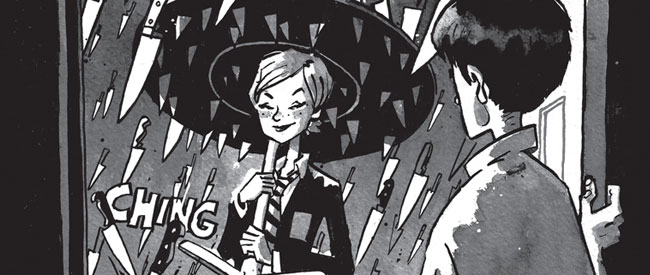
A COMICA FESTIVAL TIE-IN!
“I hate it when a book feels it has to sidle up to me all pally, nudging me and pointing out the attractions. A 10-year-old could read The Motherless Oven without stabilisers.”
This is a story unlike any other.
Stop me now if you haven’t heard those seven words before. You’ve read them in this space and wherever else critics roam free. But in the case of Rob Davis’s The Motherless Oven, out now from SelfMadeHero, they very much ring true.
Where else can you find a story in which parents are reduced to either functional or function-less objects, knives fall from the sky and pupils get taught classes like ‘circular history’ and ‘mythematics’.
It’s like tearing a pair of jeans apart, throwing them into a washing machine set to full-speed and then put them in the microwave before you reassemble them. They’ll still look like a pair of jeans, but they will feel comfortable around the hips, but not around the crotch.
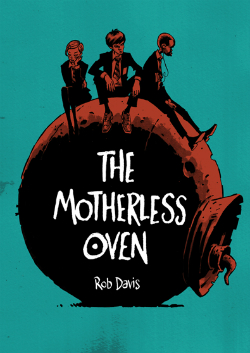 “The idea was to do something that hadn’t been done before, so I have little to compare it to,” says Davis as he tries to explain what the world-building was like for his graphic novel in which teenagers construct their parents from scraps. Literally. “The process was always weighing things in my mind to see if they ‘felt’ true. I turned a lot of things upside down and inside out, but some fit and others didn’t.
“The idea was to do something that hadn’t been done before, so I have little to compare it to,” says Davis as he tries to explain what the world-building was like for his graphic novel in which teenagers construct their parents from scraps. Literally. “The process was always weighing things in my mind to see if they ‘felt’ true. I turned a lot of things upside down and inside out, but some fit and others didn’t.
“I guess I had a template of sorts in my mind that I wanted to achieve, but that would make little sense to anyone else, because it was a combination of Searle’s illustrations, boys with inky thumbs, school books, cubism, Barbara Hepworth, coming of age classics, fantasy classics, Kes, songs by Scott Walker, words by Zora Neale Hurston… and on and on…”
Are all of these allegories created to underscore how estranged and disconnected from society and their immediate surroundings many teenagers feel?
Yes, they serve to create a teenage landscape. In part that is about feeling disconnected, it’s also about the genuine boundaries that exist for teenagers.
If you’re 15 or 16 you are at once independent yet confined, you are able to ask your own questions, seek your own answers, yet there is a sense that knowledge is in the possession of the established order. The outside world is never more outside than at the moment you leave home.
How could outside feel anymore forbidden and yet brilliant, gleaming and sharp than when it’s raining knives and there’s a girl at your front door?
The important aspect of the book formally is that its allegories and metaphors are walking, talking and falling from the sky. Comics offer the option to world-build with metaphors in a way other media possibly don’t. The impossible can walk and talk thanks to static images for movement and speech bubbles for voices.
Did you channel much of your teenage past into the book?
It’s based on the stretch of suburbia I grew up in; the house of Scarper Lee (the graphic novel’s protagonist – ed.) is loosely modeled on my own. I did run away from home, sleep rough, climb roofs etc, but I never consciously set out to make an autobiographical work.
After finishing the book I noticed a few deeper autobiographical elements that unintentionally found their way in there. These are just the colours on the palette – the book certainly is not about me. it was just created with everything I had available to work with.
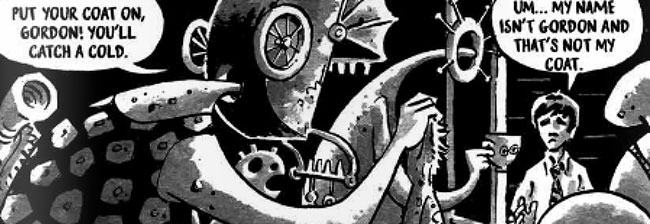
The struggle of finding your place in the world was also an underlying motif in your adaptation of Don Quixote and in Nelson, the acclaimed anthology you steered. Do you consider it the most important theme across your oeuvre?
I’m not sure whether I’d call it ‘finding your place in the world’. Maybe just recognising ‘otherness’. I think it may be more important empathically for us to find where we are the outsider than for us to look for where we are comfortable. Comfort and ease are for old age.
Was that then also the reason why you were so drawn to adapting Cervantes’s story?
Ambition, ridiculously ego and an interest in the tragedy of manhood probably led me there and then the humour and beautiful company of the characters kept me there.
Because of the unique representation of the world in The Motherless Oven, it takes a while for the reader to get a good handle on the story. Was throwing all these concepts at readers a deliberate move to make them feel uneasy, or put them on the edge of their seats at least?
It’s essential that the reader isn’t spoken down to. My job isn’t to explain the ideas; it is to make the pages turn themselves, to make the experience immersive and embracing.
I hate it when a book feels it has to sidle up to me all pally, nudging me and pointing out the attractions. A ten-year-old could read The Motherless Oven without stabilisers.
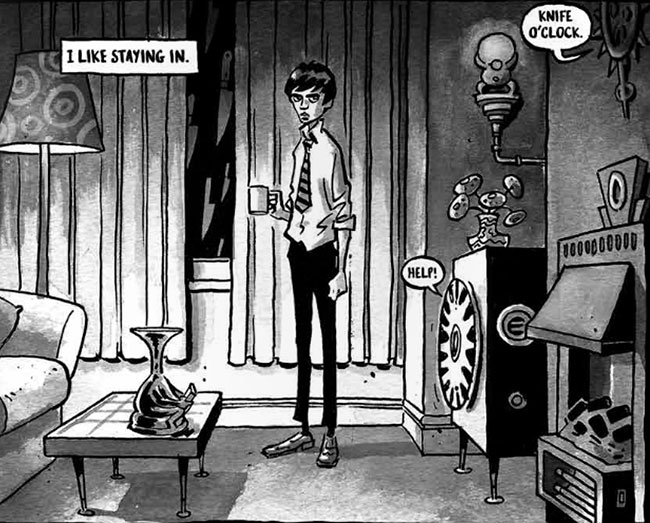
It’s interesting that for all the weird ideas thrown into the story, you hardly ever stray from classic panel structures and shapes. Did you feel that sticking to conventional grids and designs was crucial to give structure to the story?
That’s probably back to front – surely any comic artist should go for clarity in storytelling first and if they are producing some convoluted page layout only do it because the idea is to confuse the reader. Otherwise it’s like offering someone a lift on your bike then asking them to carry a four-tier wedding cake for the journey.
Another thing that struck me is that while all parents are objectified, the teachers at Scarper’s school are normal adults. What’s the underlying message here?
That teachers are the kids who were best at school? I dunno. The book doesn’t say that kids don’t grow into adults, it’s just that it is puzzled by how that transformation takes place.
There’s a line in the book that says “the thing that pulls you in pushes you away”. It reminded me in a way of the time in your career where you were disenchanted with comics. What pushed you away?
I wasn’t pushed away from the medium, it was the ‘industry’ I wanted no part of. I still don’t have any interest in being part of Marvel, DC or whatever. Thankfully now there are opportunities for me to tell my kind of stories and that’s why I’m back.
Rob Davis will be talking about The Motherless Oven on the Cult Comics Comica Conversation (in association with Broken Frontier) on November 7th. For booking details visit the Comica site here.






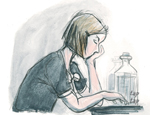
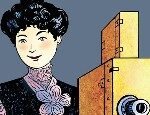
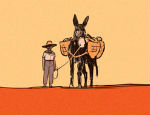
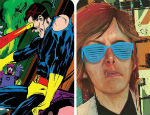


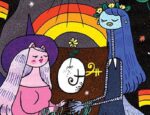
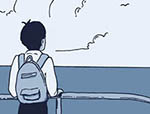
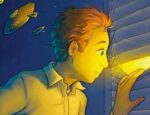
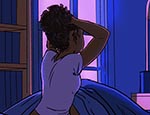
Having just read this, I was drawn in by its originality and devastated by the conclusion, so this is certainly a powerful story that you can only suggest someone read without telling them too many details.